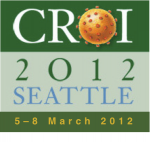High dose flu vaccine improves antibody responses in HIV positive people
1 April 2012. Related: Conference reports, Vaccines and microbicides, CROI 19 (Retrovirus) 2012.
 Simon Collins, HIV i-Base
Simon Collins, HIV i-Base
Noah McKittrick and colleagues presented results from a randomised, double-blinded study comparing standard (15-ug/strain) to high dose (60 ug/strain) flu vaccine in 195 HIV positive adults. This study used the trivalent, inactivated, unadjuvanted, split-virus vaccine Fluzone (Sanofi Pasteur). Antibody titers to three strains (H1N1, H3N2 and B) were measured using the hemagglutination-inhibition (HAI) assay.
Baseline characteristics included: 71% male, 68% African American and median age 45 (range 20-78) years. The median CD4 and nadir CD4 count of 452 (IQR 293 – 629) and 180 (IQR 53 – 318) cells/mm3 respectively. In this group, 89% were on HAART and 89% of these 89% had viral load <200 copies/mL.
Approximately half the patients had protective titers at baseline. By week 3, geometric mean antibody titers and the proportion of individuals with protective HAI titers were higher in participants vaccinated with the HD. Greater responses were seen in the high vs low dose groups but this was only significant for H1N1 +9% (0.9 to 17.8%, p=0.04), and B +12% (1.5 to 22.6%, p=0.03) with a non-significant difference H3N2 + 4% (-3.6 to 12.1%, p=0.39).
Both vaccines were well tolerated with no differences between groups and no serious adverse events.
The high dose group achieved protection rates of 80-90% (similar to standard dose in HIV negative studies) increased from 50-70% previously reported for standard dose use in HIV positive people.
Ref: McKittrick N et al. Improved immunogenicity with high-dose seasonal influenza vaccine in HIV+ individuals: a double-blinded, randomized trial. 19th CROI, 5–8 March 2012, Seattle. Oral abstract 97.
http://www.retroconference.org/2012b/Abstracts/44150.htm

